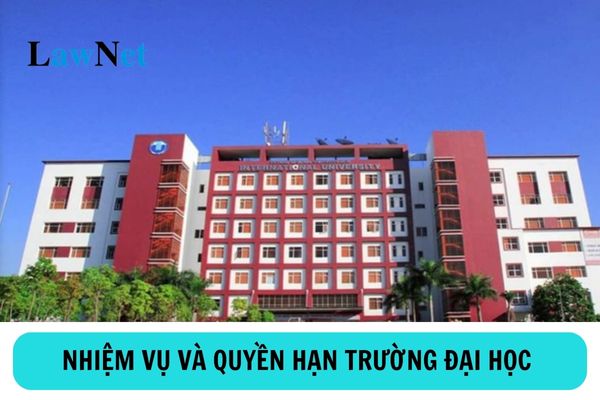What are the duties and powers of universities in Vietnam?
What is a university according to the law in Vietnam?
Pursuant to Clause 2, Article 4 of the 2012 Higher Education Law (amended by Clause 2, Article 1 of the 2018 Amended Higher Education Law):
Terminology Explanation
In this Law, the following terms are understood as follows:
- Higher education institution is an educational institution within the national education system, performing the function of training higher education levels, scientific and technological activities, and serving the community.
2. Universities and academies (hereinafter collectively referred to as universities) are higher education institutions that provide training and research in multiple disciplines, organized according to the provisions of this Law.
- Universities are higher education institutions that provide training and research in multiple fields, organized according to the provisions of this Law; the constituent units of the university uniformly implement shared objectives, missions, and tasks.
...
Thus, a university is a higher education institution. Universities conduct research in multiple disciplines, organized according to the provisions of the 2012 Higher Education Law.

What are the duties and powers of universities in Vietnam? (Image from the Internet)
What are the duties and powers of universities in Vietnam?
According to the regulation at Article 28 of the 2012 Higher Education Law (partially repealed by Point c, Clause 2, Article 77 of the 2014 Vocational Education Law and Clause 2, Article 2 of the 2018 Amended Higher Education Law), the duties and powers of a university are as follows:
- Develop strategies and plans for the development of higher education institutions.
- Implement training, scientific and technological activities, international cooperation, ensure the quality of higher education.
- Develop training programs according to identified objectives; ensure connectivity between programs and training levels.
- Organize the apparatus; recruit, manage, build, and train a faculty and management team, public employees, and workers.
- Manage learners; ensure lawful rights and interests of faculty, public employees, staff, management personnel, and learners; allocate funds to implement social policies for beneficiaries, ethnic minorities, and areas with particularly difficult socio-economic conditions; ensure a pedagogical environment for educational activities.
- Self-evaluate training quality and undergo educational quality accreditation.
- Be allocated or leased land, infrastructure by the State; be exempt from or receive tax reductions according to legal provisions.
- Mobilize, manage, and use resources; build and enhance infrastructure, invest in equipment.
- Cooperate with domestic and international economic, educational, cultural, sports, medical, and scientific research organizations.
- Implement information, reporting policies and be subject to inspection and supervision of the Ministry of Education and Training, related ministries and central authorities, and the provincial People’s Committee where the institution is headquartered or has training activities as per regulations.
- Other duties and powers as prescribed by law.
Do universities in Vietnam have autonomy? What are the conditions for exercising this right?
Based on Article 32 of the 2012 Higher Education Law (amended by Clause 17, Article 1 of the 2018 Amended Higher Education Law), the autonomy and accountability of higher education institutions are as follows:
Autonomy and accountability of higher education institutions
- Higher education institutions exercise autonomy and accountability as prescribed by law. Agencies, organizations, and individuals must respect and ensure the autonomy of higher education institutions.
...
Thus, universities are granted autonomy according to the legal provisions.
The conditions for universities to exercise autonomy include:
- Having established a university council or a board of trustees; having been recognized as meeting the quality standards of higher education institutions by a legitimate quality accreditation organization;
- Having issued and implemented organizational and operational regulations; financial regulations; internal management regulations and policies ensuring quality standards as stipulated by the State;
- Devolving autonomy and accountability to each unit and individual within the university;
- Publicizing quality assurance conditions, accreditation results, employment rates of graduates, and other information as prescribed by law.
What is the organizational structure of a university in Vietnam?
According to Article 14 of the 2012 Higher Education Law (amended by Clause 8, Article 1 of the 2018 Amended Higher Education Law), the organizational structure of a university includes:
- University council, academic council (collectively referred to as the university council);
- University president, academy director (collectively referred to as the university president); vice president of the university, deputy director of the academy (collectively referred to as the vice president of the university);
- Academic and training councils; other councils (if any);
- Faculties, functional departments, libraries, scientific and technological organizations, other training service organizations;
- Schools, branches, research institutes, service establishments, businesses, and other units (if any) according to the development needs of the university.
* The specific organizational structure of a university, the relationship, and the level of autonomy of affiliated and subordinate units are specified in the organizational and operational regulations of the university.

